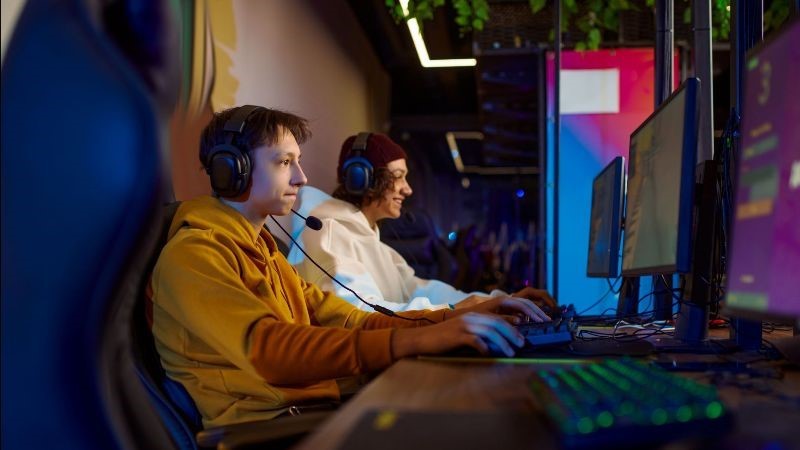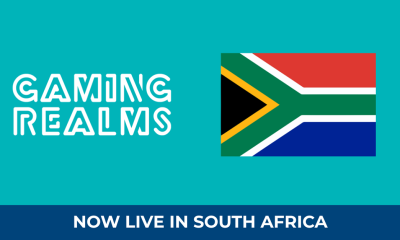Gaming
GamCare Highlights the Potential Harm Loot Boxes and Skins Betting can have on Young People

GamCare has said that the financial harm caused by loot boxes and skins betting is “a growing concern for many families and professionals working with young people”.
The comments come as the charity’s financial harm manager Raminta Diliso examines the relationship between the financial harms of online gambling and gaming with young people, and how it can be addressed.
Gaming-related products are growing in popularity but currently fall outside the jurisdiction of the Gambling Commission. The financial harm caused by these platforms is a growing concern for many families and professionals working with young people. While GamCare does not currently receive calls to their helpline regarding gaming, this may change in the future as the UK government is examining whether loot boxes could be classed as gambling, has launched a call for evidence earlier in the year.
The two most prominent products in games are loot boxes and skin betting. Loot boxes are “mystery items” embedded within games that can be purchased for randomised rewards, including “skins”. “Mystery items” are mostly made up of content that can give the player a significant in-game advantage over their peers, whereas “skins” are entirely cosmetic items that can be used by the player to customise their avatars and stand out. Young people can end up spending significant sums of their parent’s money in the hope of uncovering something of value. Valuable skins can then be traded in for real money on third-party websites.
GamCare recently facilitated a workshop to take a closer look at the issue of gambling amongst children and young people. The event brought together over 60 representatives from different sectors including financial services (banks, building societies, electronic money institutions), debt advice, gambling businesses and gambling support services as well as those who have been harmed by gambling from a young age.
The Gambling Related Financial Harm Project Steering Group, which includes organisations such as Santander, NatWest, Betting and Gaming Council and PayPlan, has called for a cross-sector response to drive these changes forward. The Group believes that all sectors could take an active role in preventing gambling-related financial harms for children and young people.
Recommendations from Gambling Related Financial Harm Steering Group:
- Gambling blocks on all under-18 bank cards
Financial services providers could ensure that every financial product aimed at under-18s has a mandatory gambling block. They could also continue raising awareness of gambling blocks amongst young people and students as they are at heightened risk of developing gambling problems.
- Gambling and financial education
Financial services firms and financial education charities could help raise awareness of gambling harms as part of their education programmes. They could work in partnership with gambling education charities, who can provide concise information to inform content development.
- Limits on gambling spend for young people
More gambling businesses could apply more stringent monitoring and checks on under-25s accounts to ensure that young people are spending within their means. They could also consider a blanket spending limit for all under-25s to further protect young people from gambling-related financial harm (as Flutter has already done).
- Preventing the use of credit use for gambling
Banks could consider what measures can be put in place to prevent students and young people from using their overdraft to gamble. The Department of Education could also work with financial services firms and student finance providers to prevent young people from using student loans and grants for gambling.
- Separate gambling within games
Gaming companies could separate gambling-like activities (such as loot boxes) within games and review the appropriate merchant category coding (MCC) for these transactions, which may allow banks to block these transactions as part of voluntary gambling blocks.
Powered by WPeMatico
Codere Online
RubyPlay and Codere Online join forces to elevate gaming offering in Mexico

RubyPlay, the studio-based content ecosystem, has strengthened its footprint in Mexico through a new partnership with Codere Online (Nasdaq: CDRO), one of the country’s leading digital sports betting and casino operators.
The collaboration sees Codere Online integrate a broad selection of RubyPlay’s most popular titles, including player favourites such as J Mania® Loco Habanero, Grand Express Diamond Class, and Zeus Rush Fever® Deluxe SE. The deal also incorporates content from Koala Games, one of the fastest-growing studios within RubyPlay’s ecosystem, featuring hits like Voltage Blitz® Rapid and Voltage Blitz® Vortex. Codere Online will gain ongoing access to additional content from RubyPlay’s wider studio network as new titles are released.
This partnership reinforces RubyPlay’s expansion across the LATAM region, where its content has been performing strongly with multiple leading brands. At the heart of this growth is RubyPlay’s multi-layered content ecosystem, designed to deliver a diverse and tailored portfolio while benefiting operators of all sizes. The model enables faster delivery cycles, greater portfolio variety, and improved responsiveness to both operator needs and evolving player preferences.
Dima Reiderman, CCO at RubyPlay, commented:
“Partnering with Codere Online represents a significant milestone in our expansion across Mexico and the wider LATAM region. The operator’s strong brand recognition and vast customer base make them an ideal partner to reach even more players. Through our studio-based ecosystem, including Koala Games and Mad Hat Games, we can deliver market-focused content to support Codere Online’s evolving strategy in Mexico and LATAM.”
Sarit Adania, Head of Casino Product at Codere Online, added:
“RubyPlay’s consistently high-performing titles will be a significant addition to our online casino offering in Mexico. By integrating content from both RubyPlay and Koala Games, we are diversifying our portfolio and continuing to deliver the engaging, premium experiences our players expect.”
The post RubyPlay and Codere Online join forces to elevate gaming offering in Mexico appeared first on Eastern European Gaming | Global iGaming & Tech Intelligence Hub.
François LaFlamme
Motorola Becomes the Official Smartphone Partner of FIFA Heroes Game

Motorola, a Lenovo company, has become the official smartphone partner of the recently announced FIFA Heroes game, published by Solace. FIFA Heroes is an arcade-style, 5-a-side football title that, for the first time, features real players, mascots and fictional IP characters on the same pitch. This partnership brings together Motorola’s cutting-edge mobile technology and the game’s immersive gaming experience, creating a seamless experience for fans to enjoy the world’s most popular sport in a fun and interactive way.
As the official smartphone partner for the FIFA World Cup 2026, Motorola is committed to bringing the excitement of the tournament directly into consumers’ hands. FIFA Heroes delivers on that promise, offering fans innovative, mobile-first experiences that keep them connected to this unique moment in time.
With this partnership, Motorola’s presence will extend across multiple touchpoints. Motorola will appear directly within the FIFA Heroes game, and many upcoming Motorola smartphones will include instant access to the newest FIFA-licensed mobile game. Fans can also download the game from the Google Play Store, making it simple to play from anywhere.
All Motorola users will gain access to exclusive in-game content designed just for them, including power up tokens and gems, game emotes, a retro razr goal celebration, playable characters, and more. This content is part of a broader collaboration that will unfold through a series of global activations, leading up to and throughout the FIFA World Cup 26, giving fans around the globe new ways to connect with the action, on and off the pitch.
Beyond the content itself, the partnership introduces a gaming experience designed specifically for the brand new razr fold, redefining what a foldable form factor can bring to the gaming space. This exclusive experience optimizes the device’s large 8.1″ unfolded display so that players get an expanded view of the pitch that keeps the action fully in focus. Plus, the extra screen space makes it so that controls can sit comfortably below gameplay for an unobstructed display, and also gives players the flexibility to customise their layout for optimal ergonomics.
“This collaboration goes beyond gaming—it’s about delivering an experience that feels faster, smoother, and more connected for every fan. By working closely with Solace and FIFA, we’ve optimized FIFA Heroes for Motorola devices so players get the best possible performance right out of the box. It’s a powerful way to show how our technology enhances the way people play, connect, and experience entertainment, and we’re excited to share even more in the months ahead,” said François LaFlamme, Chief Marketing Officer at Motorola.
The post Motorola Becomes the Official Smartphone Partner of FIFA Heroes Game appeared first on Eastern European Gaming | Global iGaming & Tech Intelligence Hub.
Bet on Games
Bet on Games Premieres Ranch Robbery — Rugged, High-Octane Crash Experience

Bet on Games unveils Ranch Robbery, a fresh crash game that infuses the wild spirit of the Wild West into the rapidly expanding instant category. The launch enhances the brand’s crash lineup with an audacious thematic approach and performance-oriented features.
As a key segment within the BETCORE ecosystem, Bet on Games keeps growing its instant and crash portfolio, now surpassing 200+ titles ready for integration. With Ranch Robbery, the brand expands its crash offerings, merging established gameplay mechanics with a unique Western theme aimed at distinguishing itself in competitive environments and captivating action-oriented players.
About the Game
Ranch Robbery takes place in a uniquely designed frontier setting where tension escalates in real time. A cowboy dashes across the ranch as the multiplier rises dynamically. The more extended the run lasts, the greater the possible payout; however, if the escape concludes before cashing out, the wager is forfeited.
Every round lasts merely seconds, resulting in a quick decision-making cycle and continuous adrenaline.
The post Bet on Games Premieres Ranch Robbery — Rugged, High-Octane Crash Experience appeared first on Eastern European Gaming | Global iGaming & Tech Intelligence Hub.
-

 iGaming6 days ago
iGaming6 days agoPRAGMATIC PLAY UNEARTHS PROGRESSIVE MULTIPLIERS IN ROLLING IN TREASURES
-

 Comatel5 days ago
Comatel5 days agoCOMATEL CELEBRARÁ UNA FIESTA PARA CIENTOS DE OPERADORES TRAS FINALIZAR EL PRIMER DÍA DE LA FERIA ESPAÑOLA, INTERAZAR
-

 Booming Games6 days ago
Booming Games6 days agoBooming Games Introduces Instastrike, the Latest Diamond Hits Trio
-

 ELA Games6 days ago
ELA Games6 days agoELA Games Powers the Reels with Retro-Electric Slot “Rapid Wild”
-

 Africa7 days ago
Africa7 days agoGaming Realms Makes South African Debut in Partnership with Hollywoodbets
-

 Blueprint Gaming6 days ago
Blueprint Gaming6 days agoNew collect modifiers and dual bonus offering star in Blueprint Gaming’s King Kong™ Splash
-

 Alex Green Vice President Games at ZEAL6 days ago
Alex Green Vice President Games at ZEAL6 days agoWunderino Adds ZEAL’s Premium Slots as Partnership Kicks Off
-

 Brasil6 days ago
Brasil6 days agoBrasil evita choque fiscal y apuestas entran en fase reputacional en LATAM



















